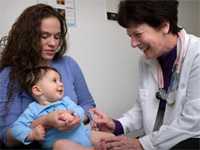Prevention
On this Page
Vaccine
There's a vaccine that can prevent Haemophilus influenzae type b (Hib) disease, the most common type (“strain”) of Haemophilus influenzae bacteria. However, this vaccine does not prevent disease caused by the other types of H. influenzae.
Hib vaccine is recommended for all children younger than 5 years old in the United States and is usually given to babies starting at 2 months old. In certain situations, people at increased risk for getting invasive Hib disease (when bacteria invade parts of the body that are normally free from germs) who are fully vaccinated may need additional doses of Hib vaccine. Unimmunized older children, teens, and adults with certain medical conditions should also receive Hib vaccine. Learn more about Hib vaccination.
View immunization schedules for children and adults.
Re-Infection

A child with H. influenzae, including Hib, disease may not develop protective levels of antibodies (proteins produced by the body to fight off diseases). This means that someone could get H. influenzae disease again. Children younger than 2 years old who have recovered from invasive Hib disease are not be considered protected and should receive Hib vaccine as soon as possible.
Antibiotic Prophylaxis
Sometimes Hib is spread to people who have had close or lengthy contact with someone who has or had Hib disease. In certain cases, people in close contact with someone who is sick with Hib should receive antibiotics to prevent them from getting the disease. This is known as prophylaxis. A doctor or local health department will make recommendations for who should receive prophylaxis.
Top of Page- Page last reviewed: July 25, 2016
- Page last updated: July 25, 2016
- Content source:


 ShareCompartir
ShareCompartir